- Home
- Joseph Bruchac
Bearwalker Page 2
Bearwalker Read online
Page 2
“It was okay.” I shrugged. “What you got for me now? The biography of Tom Thumb?”
Her face got red. Then she turned around and walked away from the desk. “I’ll be back,” she said.
I felt bad as I stood there. But I still thought I’d made my point. If I were the only African American kid in the class, would she have recommended Up from Slavery to me? She headed for Mr. Wilbur. The two of them put their heads together and did some whispering. Then she went to a back shelf and pulled out a book. When she came back, she was no longer on the verge of tears. And what she had in her hands was something really special.
I have this thing about bears. It’s not just that I’m a Mohawk Indian and I belong to the Bear Clan. It goes way beyond that. I’ve had a lifelong fascination with bears. Their gentleness and their strength has always touched something deep in me. My mom said my first word was bear and I had a stuffed one that I named Buddy. I carried Buddy with me everywhere, which wasn’t that easy on him. Mom patched him up a million times until he finally completely fell apart when I was five. Then my mom and dad and I had a funeral for him just like he was a person.
I can’t get enough of bears. I’m always reading about them. I draw pictures of them on my notebooks. I even have a bear paw design sort of tattooed into my left arm. I did it with a sharp pencil, poking it in and drawing blood with each stab. (I don’t recommend you try that, seeing as how I got an infection that ended up making my arm swell like a balloon and I had a fever for two days.)
“Here,” Ms. Mars said, holding the book out so that I could see the design on the cover.
I snatched the book so fast—like a grizzly grabbing a piece of raw meat—that I almost took Ms. Mars’s fingers with it. I don’t even recall walking out of the library. There was just me and the book. The rest of that day I spent every spare second (and most of math class) reading it. The Sacred Paw: the Bear in Nature, Myth, and Literature. I brought it back to the library the next day.
Ms. Mars looked surprised when I walked up to her desk. “Returning it already?” she said.
I shook my head. “Can I buy it?” I asked.
I couldn’t, of course, but Ms. Mars got on the Internet and helped me locate a used copy on eBay for four bucks. When we completed the transaction I grinned up at her.
“This,” I said, “could be the start of a beautiful friendship.”
Mr. Wilbur also has picked up on my ursophilic fascination. One of the reasons I like him is because he lets me get away with a lot. I don’t mean stuff like throwing spitballs or making rude hand gestures when his back is turned. Those things are adequately covered by Asa and his crew. I mean that he lets me turn just about every writing assignment into a treatise on bears. Like when we were doing poetry I used a poem from The Sacred Paw about “the heavy bear who goes with me.” (Mr. Wilbur was amused that in my critique I talked about how using bears as metaphors would work better if the poet knew something about real bears.) When we did Shakespeare I wrote three whole pages on the stage direction “Exit, pursued by a Bear.”
Mr. Wilson even aids and abets. Just last week he loaned me a book I hadn’t seen before, Touching Spirit Bear. It’s about how old-style American Indian circle justice was used on a non-Native kid who’d done a lot of bad stuff. Instead of sending him off to a juvie jail they exiled him to an island. There he ran into you know what. Eventually, after a lot of hard lessons, that kid learned to listen to his heart. I read the book in one sitting, read it again, and then returned it to him.
“You liked it,” he said, smiling. He saw the look on my face.
“You bet,” I replied. “Think we could arrange for Asa and his crew to get sent to that island?”
“Well,” he said, rubbing his chin like he was actually considering it, “maybe not an island. But there is one way we’ll be getting everyone outdoors this year.”
Mr. Wilbur loves the outdoors. He’s always saying things like “We need to attune our senses to the rhythms of the nature cycles.” And his favorite word seems to be listen. He’ll just stop in the middle of a lecture and say that.
“Listen.”
Then we’re all supposed to get quiet and listen. And some of us do eventually hear what it is he wants us to notice. Like maybe a cardinal calling from a branch just outside the open window of the classroom.
He’s taken courses on things like animal tracking, making a fire with a bow drill, building survival shelters in the forest. Now, my being an Indian, you might imagine I would know about all that stuff. But most Indian kids, even those on the rez, are not learning those things anymore. They’re too busy doing all the things other kids do—watching DVDs, playing Xbox games, and downloading rap music on their iPods. All that I knew about animal tracking was what I had read in books.
And the only real bears I’ve ever been close to are the ones I saw in the Syracuse zoo. My mom drove six hours to take me there the week before she got shipped out. I didn’t want to see the elephants or the snakes or anything else. We spent the whole time with the bears. Most people just walked past because the bears weren’t doing anything much except lying there. But I didn’t care. I just wanted to be close to them and feel their presence. I felt as if I were in there with them, looking out of their eyes, sharing their thoughts. My mom only suggested moving on once. When I didn’t answer, she sat down and put her arm around me. We stayed until one of the zoo people came and said we had to leave.
“So soon?” I said.
“Son,” the man said in a gentle voice, “was up to me, I’d let you stay all night. But we got rules here and we done bent ’em some already. It’s an hour past closing time.”
But he didn’t make us get up and go just yet. Instead he sat down and talked with me about the bears, how he liked taking care of them, though he’d rather see them out in the wild since there was always so much going on in a bear’s head and life had to be awful boring for them in their enclosure. That was why he gave them balls to play with and hid their food so they had to spend time figuring out where it was.
It was dark when he finally led us to the back gate and let us out.
Before we left, though, he tapped me on the shoulder.
“You might want this,” he said. He was holding a wooden carving of a bear. It was about the most beautiful, perfect little thing I’d ever seen. Not a cartoony bear, but like a real animal shrunk down, every detail just right.
“I can keep it?” I said as he placed it in my outstretched palm.
“Well, maybe it can keep you,” he said with a big grin. “Bears bring you luck, you know.”
“Thank you, Roy,” my mother said.
Our car was the only one left in the lot. It didn’t hit me until Mom pressed the button on her key chain to open the doors.
“Roy?” I asked.
“He served with your dad in Afghanistan,” my mother replied. Her voice was so soft I barely heard it.
I didn’t say anything after that. I just kept my hand in my jacket pocket, holding on tight to that little bear. We pulled out onto the road and I guess I fell asleep then because I didn’t wake up until hours later, when my mother opened the door to reach in and slide her arms under me. She hadn’t picked me up like that since I was in second grade, and I suppose I might have protested that a mom just doesn’t carry her seventh-grade son, even if he is still only knee high to a gopher. But I didn’t. I just leaned my head against her shoulder and felt her strong arms—strong enough to carry the whole world—holding me safe and secure as she took me up to bed.
That year-ago drive to Syracuse with my mom was the last trip I’d really wanted to take until now. And now, whether I want to or not, I am about to get on this bus for the annual eighth-grade trip to Camp Chuckamuck. Four nights in a wilderness camp to do some of those same things that Mr. Wilbur learned. I sigh as I climb the steps. Maybe I’ll really like it after all. I mean, how bad could it be? All I have to worry about is more of the usual junior high bullying I’ve been suffering t
he last six months. It’s not like my life is going to be in danger.
2
Trees
The miles are whipping by. We’ve gone from flat farmland to rolling hills. The once-distant peaks of the Adirondacks have edged closer. They’re tinged with the colors of autumn, that blood red of the maples and the yellow of the beeches flowing like colored patterns in a tapestry across the green unchanging fabric of the spruce and pines and cedars. Whiteface Mountain rises up like a volcanic peak above the others. I’m actually feeling pumped.
The thought of being among all those trees, big ones that I can get way up into, is making me feel happy as I look at those mountains that are growing larger and larger. I practically live in that big maple that grows out over the street behind Grama Kateri’s trailer. I think nothing about dangling out by one hand over the road for minutes at a time from my favorite high branch.
Mom climbed plenty of trees when she was my age. And I imagine that was true for Grama Kateri as well. After all, they were once bear cubs just like me. Among our nation, you inherit your clan from your mother’s side. Grama Kateri and Mom are both Bears. My dad, being Turtle Clan, stayed out of trees.
Maybe I’ll find a hundred-foot pine to climb. I’ve read that a few old pines in the Adirondack Park are almost as big as the ones that grew before the English and French took the tallest trees to make the masts of sailing ships.
“ENTERING ADIRONDACK PARK.”
I read that sign by the roadside aloud. It prompts Mr. Wilbur to say something in reply. He’s just come back to his seat next to me after quelling some minor disturbance in the back of the bus.
“You know we won’t actually be in the park itself,” he says. “Camp Chuckamuck is on private land just outside the Blue Line.”
“It is?” I hadn’t known that.
Mr. Wilbur hears the disappointment in my voice.
“Don’t worry,” he reassures me. “It’s just as wild at Chuckamuck as anywhere inside the park. It was a family preserve before it became a camp and they kept it pristine. It’s still that way, despite the pressure being put on the owners to sell it to developers. Plus it’s way off the beaten track. You’ll see when we get to the road that leads in. Ten miles of dirt! You’re more likely to view megafauna here than anywhere else in the North Country. Moose and even…” He pauses for effect and then just makes a growling sound.
“Bears,” I say. I’m grinning now.
Mr. Wilbur starts to say something else, but the sudden dramatic rise of a voice from behind us drowns out his words.
“All they found of that one kid was his hand. And all the fingers had been chewed off!”
I don’t even have to turn around to know who it is. Willy Donner, of course. His foghorn tones reverberate through the whole bus. He’s three rows back, trying to freak out the girls in the seat across from him with stories about the cannibal of Camp Chuckamuck.
“His name,” Willy continues, pausing and lowering his voice for dramatic effect, “was Jason Jones. His parents brought him to Camp Chuckamuck twenty years ago. He was huge for his age, but he wasn’t really smart. The other kids teased him and played mean tricks. What they didn’t know was that they were driving him crazy and that he was wicked strong. One night, after they put a dead rat in his bed, he just ran screaming out into the night and never came back. No one could find him. But the next night the boy who had put the rat into Jason Jones’s bed vanished. A trail of blood led from his cabin into the woods.”
I take a quick look over my shoulder. Heidi and Tara, the two Willy’s words are aimed at, have disinterested looks on their faces. But they’re still listening as he gruesomely chronicles how one camper after another disappeared.
“They started finding things around the camp. There were piles of eyeballs that had been pulled out and human leg bones with tooth marks on them.”
Willy’s voice gets louder again. He’s approaching the climax. “The state police finally tracked Jason Jones down to a cave in the forest. That cave was piled high with chewed human bones and there was a big iron pot in which he was cooking up a batch of camper soup. Even though the police shot him again and again, he wouldn’t die. He just kept coming at them until they finally had to use a flamethrower.”
I look over at Mr. Wilbur, who is rolling his eyes like I am. Like flamethrowers are standard issue for state troopers? Talk about overembellishing.
“But before he died, engulfed in flames,” Willy concludes, “the last words Jason Jones howled were ‘I’ll be back.’”
Mr. Wilbur has his head in his hands. Like me, he doesn’t know whether to laugh or cry. Although I have to admit that some of the details of that story have creeped me out.
But Willy isn’t done yet. He leans toward Heidi and Tara, his voice a harsh whisper: “Every year the ghost of Jason Jones, the cannibal of Camp Chuckamuck, comes back to claim another victim. And this time it might just be…YOU!” As he shouts that last word, Willy grabs Heidi by the arm and she screams.
Mr. Wilbur stands up and turns around. He doesn’t do it quickly, but he has a presence that makes people pay attention to him, whether in the classroom or on this bus full of overstimulated teenagers. He speaks just one word. Firmly.
“Enough.”
Willy sinks back into his seat and directs his eyes forward. Heidi, who enjoys acting hysterical, stops screaming, even though she is still rubbing her wrist where Willy grabbed her. Tara, too cool to fall for Willy’s tale of terror, just shakes her head in disgust.
Mr. Wilbur slides back into his seat in one easy athletic motion. He was a gymnast in college. He’s the only teacher I have ever met who can do a backflip.
“Urban myths,” he says. “Well, actually rural.”
“An unconvincing mélange of overworked motifs,” I add, putting on my best professorial voice.
Mr. Wilbur chuckles and holds up his right hand to tick them off on his fingers. “I Know What You Did Last Summer,” he begins.
“Friday the 13th,” I add.
“Halloween,” he continues, shaking his head. “Poor Jamie Lee Curtis.”
“With a little touch of The Terminator,” I conclude.
“I’ll be baachh,” Mr. Wilbur intones, nailing the Austrian cyborg accent.
Three seats back, Willy is talking again. Mr. Wilbur sighs but doesn’t do anything. You can’t keep a bad storyteller down. At least Willy is soft-pedaling it below foghorn level now. I can still hear him though.
“You know,” Willy says, “Camp Chuckamuck was built on an old Indian graveyard.”
Now I roll my eyes. It always comes back to that. Every spooky place in America, it seems, was built on an old Indian graveyard. I’m as sick of hearing that as I am of being told that the only real Indians live west of the Mississippi. But Willy isn’t finished yet.
“You know what the word Chuckamuck really means?” he asks. “It means place of many chewed bones!”
Now I’m ready to stand up, but Mr. Wilbur holds out his hand. I settle back in my seat. I understand. It’s not the time or place to get into this. All I’d be doing would be knocking my head against the wall. What Mr. Wilbur expects is that after a few days together here at the camp, things will change. We will learn in spite of ourselves, inspired (as the camp brochure reads) “by the healthy outdoor atmosphere and the natural environment of Camp Chuckamuck, whose name means Place of Happy Meetings in the language of the first peoples of this land.”
I think it’s a faint hope. People don’t change overnight, even in a healthy outdoor atmosphere. The bus bumps and sways into a turn. I look out the window. We’ve just turned onto that dirt road Mr. Wilbur mentioned. Hills crowd in on either side, and evergreen trees are thick all around us. It’s almost like we’re going into a tunnel that leads to another reality.
Thinking of reality, Chuckamuck is not a word that means “Place of Happy Meetings” in the Mohawk language. In Mohawk it doesn’t mean anything. That’s par for the course when it comes to most outdo
or education places. They like to use phony Indian names. Either they spell them wrong or don’t translate them right or they just plain make up some weird word that they think sounds Native American.
I’m feeling sort of depressed now, despite the trees and the chance of seeing a bear. Too many things are going through my head, especially that image of Jason Jones’s cannibal cave full of bones. I know the yarn that Willy was spinning is just a crock. But it’s made me think of another tale, one that really is old and traditional. There was a real cave full of chewed human bones in the story of the monster bear.
3
First Sight
“Yo, Mr. Wilbur, are those real?”
“Check it out!”
“Look at that!”
Thirty-three other Pioneer Junior High eighth graders stare out the windows as our bus slows down. We’re creeping over a wooden bridge that spans a swampy forest meadow and deepens into a pond created by a long beaver dam. The dam is about fifty yards back from the road and it’s a miracle of animal engineering. It has to be a hundred yards long. But that intricately fashioned wall of mud and peeled sticks is not what’s attracting my eyes or those of the other kids. Some of them are holding up their cell phones to take pictures of the center of all our attentions. It’s our first sight of creatures we’ve been told about but have never seen before.
“There she goes again!”
The cow moose that is three times as big as any white-tailed deer lowers her head once more into the pond. She raises her head and water streams off her. A braid of water weeds hangs like a beard from her jaw as she chews the plants she’s foraged from the bottom. She seems oblivious to the presence and noise of our passing. Behind her, in shallower water, her two calves stare over their shoulders at our bus.
For a moment I feel as if it can’t get better than this. We haven’t even gone a mile yet off the main road and we’ve already experienced something I’ve only imagined or seen in pictures. Those big animals seem like beings out of the past. I feel as if I’m no longer in the twenty-first century, but in a time where the old stories are alive.

 Peacemaker
Peacemaker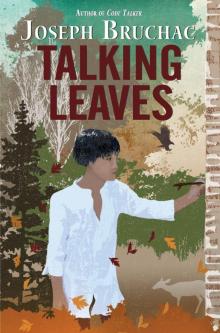 Talking Leaves
Talking Leaves Found
Found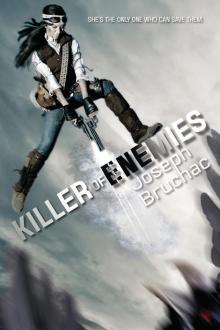 Killer of Enemies
Killer of Enemies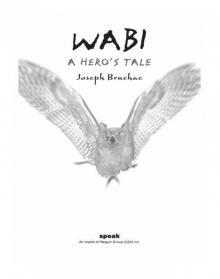 Wabi
Wabi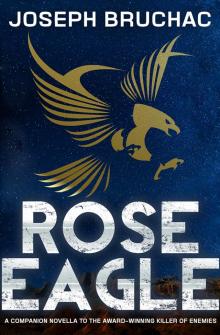 Rose Eagle
Rose Eagle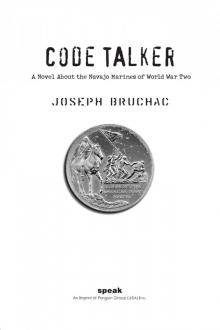 Code Talker
Code Talker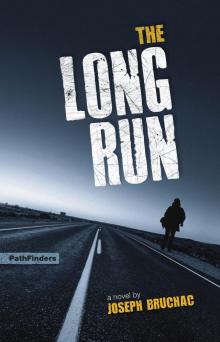 The Long Run
The Long Run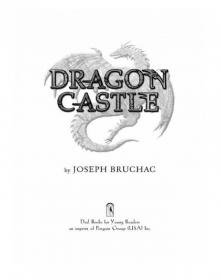 Dragon Castle
Dragon Castle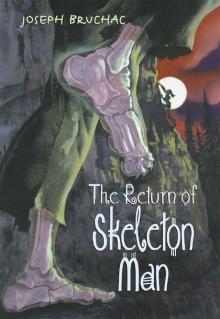 The Return of Skeleton Man
The Return of Skeleton Man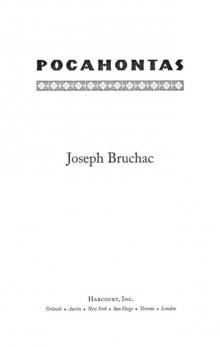 Pocahontas
Pocahontas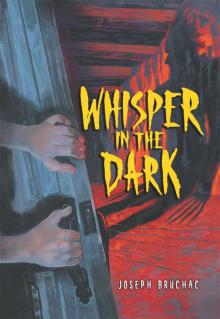 Whisper in the Dark
Whisper in the Dark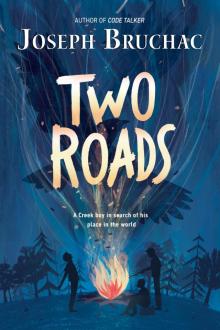 Two Roads
Two Roads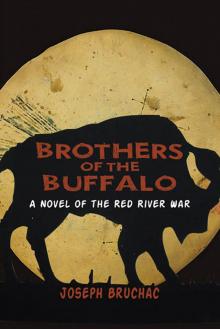 Brothers of the Buffalo
Brothers of the Buffalo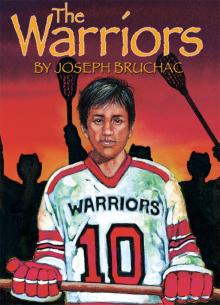 The Warriors
The Warriors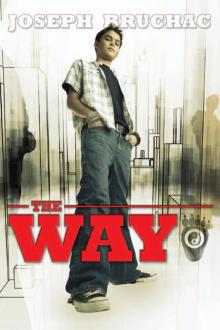 The Way
The Way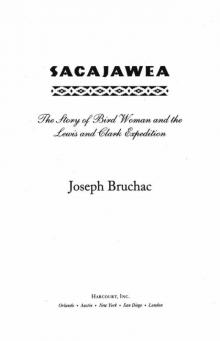 Sacajawea
Sacajawea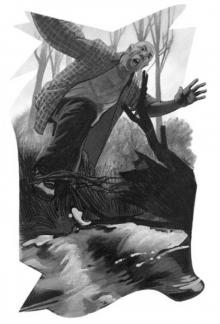 Night Wings
Night Wings March Toward the Thunder
March Toward the Thunder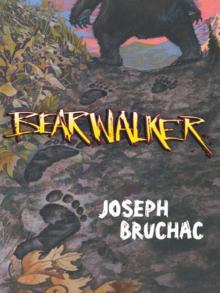 Bearwalker
Bearwalker Skeleton Man
Skeleton Man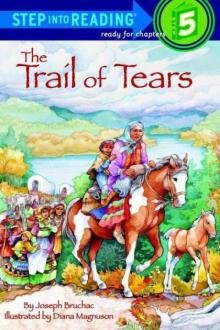 The Trail of Tears
The Trail of Tears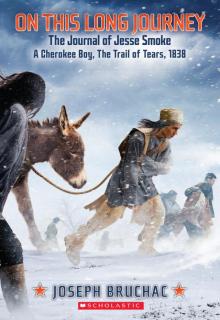 On This Long Journey
On This Long Journey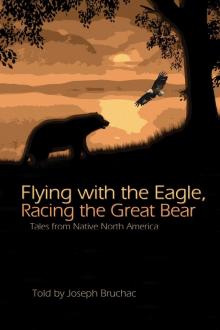 Flying with the Eagle, Racing the Great Bear
Flying with the Eagle, Racing the Great Bear